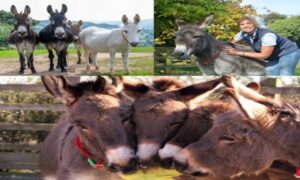Animal Stories Across the World: The Donkey Sanctuary in Sidmouth, Devon, UK
Exclusive Interview with Maxine Carter, Farm Manager
By Karen Beishuizen
Photos courtesy of The Donkey Sanctuary
In 1969, Dr Elisabeth Svendsen MBE made a dedication to one donkey by the name of Naughty Face. 50 years on, her legacy has enabled The Donkey Sanctuary to take 20,000 donkeys into their care. Currently it has more than 6,000 of all ages in its care in the UK and Europe. On average, the lifespan of a donkey is between 27-30 years. The oldest donkey in the sanctuary’s care lived to 57 years of age. People can Adopt a Donkey via their website. Adopting a donkey is a great way to support The Donkey Sanctuary. From just £3 a month, it helps pay for food, medicine, veterinary care and farriers, as well as helping them to rescue more donkeys in need. People can visit their adopted donkey at the sanctuaries for free too. Donkeys have been a cornerstone throughout human existence, and they still prop up entire communities today, ferrying water, food and crops. Around the world, around 500 million people in the world’s poorest communities still rely on working donkeys as a lifeline to support their livelihoods. If you are in Devon, UK, visit The Donkey Sanctuary because Donkeys are, quite simply, amazing!
KB: Describe to the RSR readers how The Donkey Sanctuary was founded and by who?
The Donkey Sanctuary was founded by Dr Elisabeth Svendsen in 1969, and in 1973 the organization was registered as a charity.
KB: How many donkeys are there and what are their age?
Since its beginning, The Donkey Sanctuary has cared for more than 20,000 donkeys, and now has more than 6,000 of all ages in its care in the UK and Europe.
The sanctuary does not breed donkeys, but females may come into the sanctuary already pregnant, so we have donkeys that are just a few months old to elderly donkeys are into their 30’s.
On average, the lifespan of a donkey is between 27-30 years. The oldest donkey in our care lived to 57 years of age.
KB: Where are the donkeys coming from?
Donkeys come into our care for a number of different reasons. Most are relinquished to us by owners who can no longer provide the care they need. But some are rescued after being found in very poor health and living in conditions that affect their welfare.
KB: How can people adopt a donkey?
People can Adopt a Donkey via our website. Adopting a donkey is a great way to support The Donkey Sanctuary. From just £3 a month, it helps pay for food, medicine, veterinary care and farriers, as well as helping us to rescue more donkeys in need. People can visit their adopted donkey at our sanctuaries for free too.
KB: Describe to the RSR readers what daily work at The Donkey Sanctuary looks like?
We have teams of dedicated grooms who care for our donkeys 365 days a year. They ensure the donkeys are looked after and receive the highest level of care at our sanctuaries and farms.
KB: Is the sanctuary open for public?
Our main sanctuary in Sidmouth, Devon, which is also our international HQ, is open to the public every day. Entrance to the sanctuary, and parking is free, although donations are welcome.
We also have an onsite restaurant and gift shop, and as well as hundreds of adorable donkeys to meet, there are daily talks, engaging exhibits, scenic walks, and even a children’s playpark and a maze to explore.
Our regional sanctuaries in Birmingham, Manchester, Leeds, Belfast and Ivybridge have smaller herds, and are also open for the public to visit for free on certain days. Visits need to be booked to visit our regional sanctuaries via our website.
KB: Are the donkeys living a happy life at your sanctuary and how do you know?
For over 50 years, we have ensured that donkeys in the UK receive excellent care and welfare and enjoy safe and fulfilled lives. Focusing on the five animal-welfare domains, we promote optimum nutrition, health, behavior, environments and mental states for donkeys.
We also aspire to greater donkey wellbeing – for donkeys to experience stable relationships, enjoy appropriate physical exercise and mental stimulation, and to be recognized as intelligent, emotional animals. Our staff form close bonds with our donkeys, and we believe our donkeys are living a very happy life in our care
KB: Can people volunteer to help in the sanctuary?
We have an amazing team of volunteers who help us in many different ways at our sanctuaries. Not only do they provide quality time for our resident donkeys, but they also show visitors around our main sanctuary, and even help our conservation team in their work to improve our land for our donkeys and habitats for native wildlife.
We also have Donkey Guardians, who provide safe homes for life for donkeys on our Rehoming Scheme. Guardians are essential to our work, as they free up valuable space on our sanctuaries for more donkeys in need.
KB: What is so special about donkeys?
Donkeys have been a cornerstone throughout human existence, and they still prop up entire communities today, ferrying water, food and crops. Around the world, around 500 million people in the world’s poorest communities still rely on working donkeys as a lifeline to support their livelihoods.
They are highly intelligent creatures, sociable and calm, capable of independent thinking and decision making. They are strong and won’t do something they consider unsafe, which makes them a great, trusted companion.
Donkeys are, quite simply, amazing.
Check out The Sanctuary’s website: HERE
Click Here to Order Boxing Interviews Of A Lifetime By “Bad” Brad Berkwitt


